#all entertainment is political. all of it. because politics is the models we use to describe how we interact as a community
Explore tagged Tumblr posts
Text
I mean sure, I can understand this perspective, but I'm not sure whether most people feel less shaken to be thrust into conversations about "self-unaliving" than conversations about "suicide"
and I for one as a survivor would much rather unexpectedly encounter somebody talking about "rape" than somebody talking about how funny it is to have sex with somebody when they don't want to, a normal thing that doesn't need to be named because it's So Normal.
which is to say. this is a post about words. the words are not the distressing thing about the discussion. the distressing thing is the distressing thing about the discussion. sugarcoating, dodging or renaming the distressing thing doesn't make it less distressing but it DOES often make it harder to have a frank discussion about it or address it in serious terms.
[pinch of salt: solid probability from their blog that this person is a Literal 14 Year Old and the perspective from 30 and 14 are very different. I do stand by all the points I'm making but I think this conversation lands a lot different for people at different life stages - there is something to be said for the general issue that the internet has flattened social groups to the degree that I as a 30 year old can make a post to my audience of largely adult millennials that immediately enters the same conversational space as people half my age and still in school. that seems. ungreat. as the primary way we engage in conversation. but I don't have solutions to offer.]
you gotta be able to say "die"
you gotta be able to say "suicide"
you gotta be able to talk about "sex"
they're uncomfortable topics, YEAH for SURE
because LIFE is uncomfortable. Death and suicide and sex and pain are straight up going to happen. not having words for the way it discomforts you doesn't make it more comfortable, it just makes you less able to reach out about it.
even more vital, you gotta be able to say words like "rape", "abuse", "queer" or "racist". cause we fought fucking hard to name those experiences. to identify "rape" as distinct from "sex" and "racism" as distinct from "acceptable behaviour" and "queer" as distinct from "invert"
like the function of communication is not to minimise immediate discomfort. we gotta be able to talk about stuff that's hard or sucks or causes difficult conversations.
#red said#i also wholeheartedly disagree with the rest of your post#all entertainment is political. all of it. because politics is the models we use to describe how we interact as a community#and art is inherently communal. so it's inherently political.#that doesn't mean all entertainment has to be a Pure Political Statement. some stuff is just dumb because dumb shit is fun.#but like it's not. detached from the world. and a lack of political intent doesn't mean it's utterly unchallenging.#ok for example. have you ever. enjoyed watching a cheesy 80s zombie movie and it is gory and stupid and great#but then there's a scene where maybe there's a really fucked-up implication about what we as an audience are meant to think#or a rape scene played for light laughs. or whatever your line is.#and they meant it to be fun. you watched it for fun. but you're not having fucking fun any more. there's a bad taste in your mouth.#contrast. sometimes i am reading a nonfiction article for work or something. it is miserable and grim it is about homelessness and dv#but the writer has put it together so well and made their point so clearly you're like YES! YES! THAT'S IT!!!!#and even beyond that like. i am a disabled multiple rape and abuse survivor. i have been through a non zero amount of The Shit.#and a lot of the stuff i find most entertaining and relaxing is stuff that acknowledges that as a Thing Which Happens#like I'm a nerd man. i like video essays about misogyny and fascism and reactionary homophobia.#i like films that make me cry bc they touch an emotional raw spot. i like tiktoks where people joke about their experiences of abuse#i like SFF stories about trauma and survival and sad robots#and yeah you know sometimes i want to watch a comedy panel show or a tiktok of bottles rolling down stairs#but effective entertainment is a conversation! comedy and chill vibes rest on like. deciding what to riff on#and who your anticipated audience is. and nah actually that's not apolitical and also#identifying common human experiences like death or trauma or marginalisation as inherently Political and therefore Unfun#misses the point that like. the question isn't what you acknowledge but how you acknowledge it.#as a rape survivor. for example. i don't necessarily want to open tiktok to a lecture on rape culture.#but i might well stick about for a standup routine about being a survivor of rape#and i will absolutely bounce from a vid where nobody mentions rape bc they think what they're talking about is fine when it's. rapey af.#anyway. this is a sidebar cause even if i agreed about entertainment v politics my main point would still stand#but i very much don't agree and i think you need to maybe look at how you approach entertainment media as neutral#but also i feel very strongly about this and not to harp on the like aS A sUrViVoR thing but#AS A SURVIVOR my fucking LIFE includes ''dark topics'' like suicide and rape. and i don't appreciate how often that's treated as#an unfair imposition to speak about or acknowledge. 'dark shit' is inescapably a major part of my life/self AND I'm funny + entertaining
136K notes
·
View notes
Text
Paws in a Circle
There’s a poster I saw once, back on Earth, that had a silhouette of a bear with deer antlers, and it was labeled “Beer.” I had forgotten about it completely until I met our newest client, who by that logic was definitely a beer.
I’d already done my part of the interaction by carrying out one of the heavier boxes, so while the captain went over the delivery fees with her, I was free to stare politely and decide which other Earth animals she resembled. (Fur coloring more like a red fox, and semi-upright posture that was less bear and more extinct giant ground sloth.)
I was so focused on watching the client handle the datapad with her giant paws that I completely missed it when the hovercar behind her sprung a fuel leak.
Paint saw it, though. “Oh! Your car!” she yelped, pointing. “I’ll get Mimi!” She was off in a flash of orange scales, back into the ship in search of our mechanic.
The client growled a swear word that didn’t translate, shoved the datapad back at Captain Sunlight, then galloped over to her car. While I expected her to throw open the hood in search of the part that was leaking, she instead made a beeline for the back seat.
When she threw open that door, I saw why.
“Kids! Out of the car! It’s not safe!”
A half dozen bundles of spotted yellow fur tumbled out, making distressed noises that didn’t need translating. They had tiny little antler buds and very big eyes.
Captain Sunlight was busy talking to someone through her communicator, probably Mimi. I stood there uselessly by the packages. What did I know about fuel leaks? Nothing helpful. I knew the puddle was growing by the second, and was probably flammable, but that was about it. And this backwater spaceport barely had an information booth, much less a local response team.
The client ushered her cubs over to where we stood just as Mimi and Paint returned. Blip and Blop followed with a big toolbox carried between them. Mimi was already taking charge and waving tentacles about, talking to the captain about the lack of reliable repair shops this far in the boonies, telling Blip and Blop how best to use their muscles in opening up the engine, and reassuring the customer that this was fine, actually, that model hovercar had a known issue with the fuel lines.
When the client dithered over minding her cubs and being present for the repairs, Captain Sunlight pointed a scaly yellow hand at me. “Our human can keep your little ones entertained. Bring them over here.”
“Uh,” I said.
Captain Sunlight looked up at me, still talking to the client. “She has extensive experience in tending to small furry creatures.”
I wanted to say that veterinarian training and childcare were two very different things, but I wasn’t about to make the captain look bad. And knowing Mimi, this would be quick.
The client said, “Thank you. Kids, you need to stay over here, okay? Next to these boxes, but don’t touch. Listen to the tall one. I’ll be right there helping fix the car.”
The tiny-voiced replies were recognizable words in the most common trade language, though their pronunciation made me clock them at around three or four years old in human years. They were very cute.
And they were suddenly my responsibility, all looking up at me like spotted teddy bears while the rest of the adults fretted about the car.
The questions were immediate.
“What are you?”
“Where’s your fur?”
“Did you lose it because you ate the wrong thing? Mommy says we have to eat our vi’mins so our fur doesn’t fall out.”
“Is this instead of fur?”
I freed the tiny paws tugging at my pants. “I’m not supposed to have fur. I’m a human. And yes, I wear clothes to keep me warm instead.”
“It looks funny.”
“Do you have to brush it?”
“Do you know any games?”
I brightened at that. “Games! Sure, I know some games.” I wracked my brain for something that would keep them entertained without causing new problems. “What kind of games do you like to play?”
They all answered at once in an avalanche of words, bouncing around in excitement, with a couple grabbing each other’s fur to keep from falling over. I couldn’t make out a thing they were saying. But I had the beginning of an idea.
“Do you like dancing in a circle?” I asked.
They had no idea what I was talking about, and possibly no understanding of basic shapes yet. Three of them spun in place while the others waved their arms.
“First you stand in a circle, like this,” I said, sketching out the shape in midair. “Here. You stand here, then you there…” With some gentle nudging — they were so soft — I soon had them arranged in something like a circle. “Now hold hands with the person next to you.”
I was a little concerned that their paws weren’t suited to this, since they had long blunt claws already and didn’t look very dexterous, but they managed. With lots of giggling and hopping in place.
“Now everybody step to the side, in this direction.” I ushered them into a clockwise rotation, nice and slow (and giggling), with no risk of any little fluffy heads bonking onto the spaceship landing pad. It took them a second, then they got the rhythm without tripping over their own feet.
Then they unanimously spun faster, hopping and laughing with squeals and barks that were probably making more than one adult turn to stare. I don’t know; I kept my eyes on the littles. My arms were out and ready in case somebody stumbled and brought the whole circle crashing down.
But no one did. The half dozen youngsters wheeled and spun, bouncing with glee and showing no sign of stopping.
“That’s new,” rumbled a voice behind me. I tried not to flinch when I looked up at the mama bear. Beer. Whatever. She asked, “Is that an activity from your planet?”
“Yeah,” I said. “Pretty basic, and it seemed good for kids.”
The antlered head nodded. “Looks like valuable practice at coordination, as well as teamwork. There are a few adults I know who could benefit from that.”
Images flashed through my head of huge antlered bear aliens doing ring-around-the-rosie as a corporate teambuilding exercise. And professional athletes trying to improve their footwork. “Yeah, they probably could. And it’s a fun bit of community bonding time.”
Mama Bear nodded. “Okay children, the car is fixed,” she announced. “Time to go home.”
The cubs made the exact same disappointed noises as human kids. Even when their mother waded in and picked them up one by one to urge them towards the car, they didn’t want to stop playing. They grabbed hands in pairs and spun off that way, even faster than before. I did have to catch one fuzzy little teddy toddler, who just laughed about it and hopped around some more.
Peripheral vision told me the rest of the crew was helping move the packages into the hovercar’s storage space and mop up the last of the fuel. Overheard conversation told me that the good captain had tactfully gotten us a bonus payment for the mechanical assistance. I couldn’t tell if childcare was part of that, and I didn’t ask. I just focused on herding the excitable youngsters back to their car, where thankfully they all knew how to get into the safety harnesses without help.
Mama Bear closed the door. “Thank you for everything,” she said, directing that at me as well as Captain Sunlight. “I will recommend your services highly to anyone who asks. And we will probably need more deliveries soon, once we get the new house set up, so perhaps we will see you again!”
Captain Sunlight nodded. “Perhaps so. It was a pleasure doing business with you.”
I waved goodbye to the kids, who had found the button to open the window and were just as excitable as ever. “See you later! Maybe next time I can teach you the Hokey Pokey. That’s big on my planet.”
~~~
These are the ongoing backstory adventures of the main character from this book.
Shared early on Patreon! There’s even a free tier to get them on the same day as the rest of the world.
The sequel novel is in progress (and will include characters from these stories. I hadn’t thought all of them up when I wrote the first book, but they’re too much fun to leave out of the second).
249 notes
·
View notes
Text
Oh my gosh the way the Pop-Up Shop event ended and what it hinted at that's going on rn, and what it might imply about what's in store for the next time we see Sampo, I'm so excited AAAAAAA
Because it seems it really IS our Sampo, and whereas before I was absolutely delighted by the thought that he was possibly getting fucked with by some outside influence, and that was why he was saying such strange things... There's nothing quite like that going on here. There's no memetic virus messing with his head. There's no imposter, no possession, no nothing.
Just Sampo, and the ominous, all-consuming dread that hangs over his head like a guillotine, as he willingly walks right into what he is sure is a trap. ♡
Because this event was weird right off the bat, yeah? Sampo invites us in on a business deal that won't make him any money? The hell???
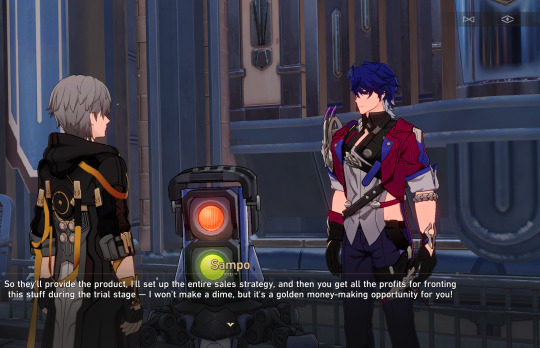
And I was just waiting on pins and needles for it to make sense, and oh, I was not disappointed at all. Because I've got a nice meta post about it over here, but Sampo actually DOESN'T make a lot of money most of the time- but he does always get something out of his dealings. He works for favors and good will and networking, but never for nothing. And it was the same here!
Sampo didn't make any money with this little business venture because that wasn't what he needed from it. That was never his goal to begin with. He just needed something entertaining.
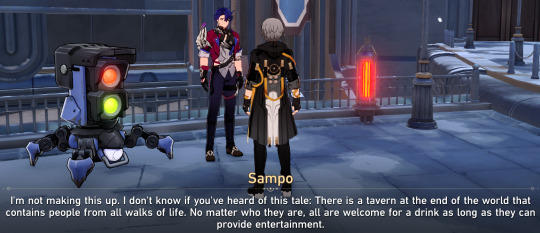

Sampo has the key to get into the tavern's basement where Sparkle has been keeping his mask for him, but he still needs to be let into the front door of the tavern itself. The fun stories he got from this event were his entry fee. He leaves at the end because he's probably already on his way to Epsilon, where the World's End Tavern should be.
So that explains part of what was so strange this event. It's the rest of his ooc tendencies that have me like foaming at the mouth though because AAAAAAAAAA
There's long been hints of...some? kind of strain between Sampo and the rest of the Masked Fools. Like it starts all the way back in Belobog's main quest with the big infamous fourth-wall breaking sequence, where Sampo talks some shit.
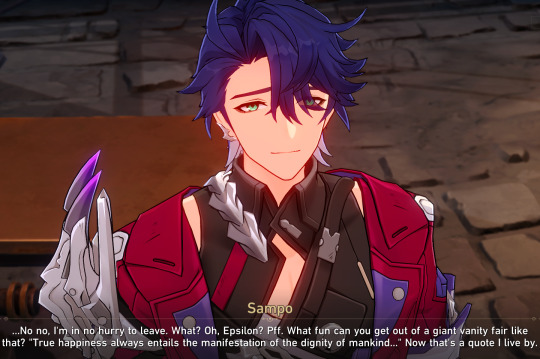
And it continues in the Aetherium Wars event, where we finally get the confirmation that Sampo is a Masked Fool and even get to see him interact with Giovanni, one of his brethren! And where Sampo talks more shit. He also leaves the trailblazer a warning against Sparkle, who they hadn't met yet, and probably the Masked Fools in general.
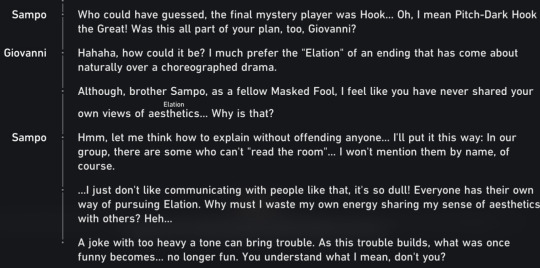
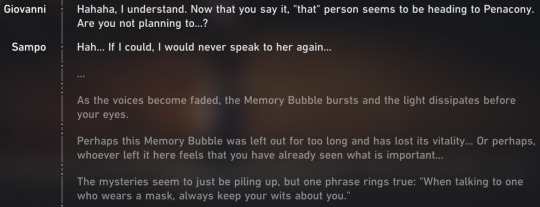
And for some strange reason, it seems to be popular fanon that Sampo like. Talks a lot of shit? Or is rude in general? Like I feel like I see a lot of jokes about if Hook says a cuss word, it was probably his fault. But Sampo is actually pretty polite with everyone. I think the only time we really see him be harsh is when he has to set some hard boundaries in the museum event. Otherwise, he conducts himself like a model friendly businessman. Like he IS super shady and slimy, but he's still polite about it. I'm pretty sure the only time he actually talks any shit, and so bluntly, is about the Masked Fools or Epsilon as a whole. He really seems to have some sort of beef with them.
There's also his hilarious relationship with Sparkle, which I'm including for consideration because we don't know how common people like her are in the Masked Fools, so she might represent how Sampo interacts with a lot of them. ...But I'm pretty sure Sampo's grudge with her runs deeper than that anyway jdksajfdkljas
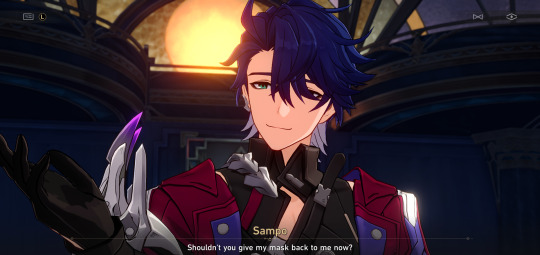

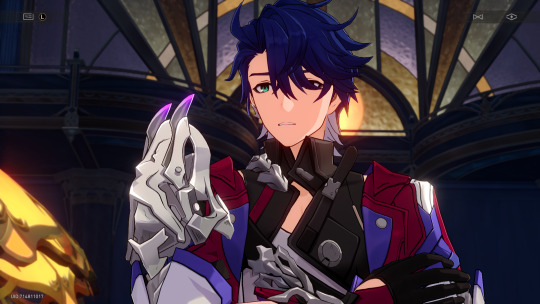
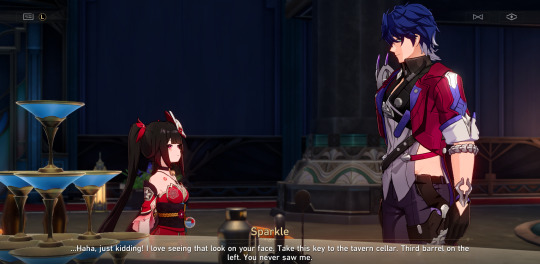
She's so funny I hope she fucks with him more FJDKSJAKD
Anyway, the point is, Sampo doesn't seem to see eye-to-eye with a lot of the rest of Aha's followers. And it was never hinted at before the pop-up shop event, but now I'm wondering if it might be like. An actual dangerous sort of situation.
Because during those brief packaging sequences, you get some. Pretty wild text dropped on you. There was actually a really cool explanation for it by another user already! But basically, all of the phrases are more fourth-wall breakage. They're mostly in-game achievements...except for one.

"This must be a trap create"
We never get to see the rest of the phrase. Just "This must be a trap create."
That is the only one we don't have an explanation for yet, at least as far as I know.
AN EDIT: Thank you to @/kittaykattz for this one, because it looks like someone DID find the source of this line. Unfortunately, it only came up in my search after I looked for the full phrase. I couldn't find it on the wiki before orz And yet this somehow does NOT make it any less ominous ajfdklsjkl The full phrase is "This must be a trap created by a Masked Fool!" and it comes from another in-game achievement, "Boxes and Ladders." Which is really cool, because I had figured the last line must be something from Penacony, since it was the only area not represented so far. So in that way, it fits perfectly with the rest of the text. Now we have one achievement from every area of the game, which fits with the theme that Sampo has been following the Astral Express, the trailblazer specifically. It's the way that it doesn't fit that's the weird part though. Because the rest of the lines that come from in-game achievements are all titles; that's why they were so much easier to find. For some reason, Hoyo saw fit to single this one out. They didn't use a title. They specifically chose the line about falling into a trap set by a Masked Fool, a trap with seemingly no way out, where one's only choice is to take a leap of faith and pray to make it out ok in the end.

Love that. Absolutely love that. That's so fucking tasty, I will be daydreaming for days on end now about Sampo finding himself in a horrible situation with no way out where all he can do is make a desperate attempt and pray to whatever might listen (probably not Aha fjaksljdk) that he'll survive it WHEEEEEE
Because Sampo talks so strangely throughout the whole event, but it gets worse day by day, morose and morbid and dreading and sometimes even almost like he's warning the trailblazer against something about to happen.


I've already lovingly discussed it in an analysis about Sampo's name (alias included) but like. There certainly are some fun connections there. The Sampo of myth was smashed and lost to the sea. Poisson was flooded. Brueghel died suddenly and left a final painting of a storm at sea unfinished.
The Masked Fools are referred to with imagery of water and the sea. And frequently so.
And so I do wonder what Sampo knows, and what he's expecting to happen when he gets to that tavern at the end of the world. If maybe he thinks he's walking right into a trap, and is doing it willingly, doing it anyway, because, well.
Belobog is on the line.
And Sampo has already proven he seems so ready to do whatever it takes to protect it.
#DEATH FLAGS AHOY WOOHOO#I HOPE WE GET TO SEE HIM GET FUCKED UP SO BAD YAY#honkai star rail#honkai star rail sampo#hsr sampo#hsr#sampo koski
135 notes
·
View notes
Text
The Only Friends Conspiracy Corner
Welcome to my Only Friends conspiracy theory corner, where I lose my mind on the regular and explain why I believe Only Friends is a veiled commentary on the Thai BL entertainment industry and its relationship to Thailand's soft power economic model, especially Thailand's gay (aka pink money) tourism. As The Heart Killers gets relatively explicit about issues of structural political and economic power, now seems as good a time as ever to talk about Jojo’s last show that seemed to me to put so much of its political work in the subtext. This is just the starter pack. Hit me up with more thoughts anytime!
The Only Friends Hostel business. We have business majors in this show, a rarity in Thai BL, and for their class project they're opening a hostel. Each member of the friend group has a business role to play--Ray provides the real estate, Mew takes on leadership of finances and accounting, Cheum provides PR, and Boston's tasked with creative direction--but the value of the individuals, their roles in the business, and their willingness to collaborate with one another is the tension that drives the series. The characterizations, dialogue, and events in the series ought to be viewed in light of this. Mew, for example, partners off with Top, who encroaches on the friends' trivia group to answer for them a question about Thailand's first hotel, The Oriental, which two Americans established for sailors in Bangkok shortly after the opening of the Kingdom of Siam to international trade in 1855 and later two Dutch business partners reestablished after a fire. A single answer links Top to the influx of Western capitalism in the form of a hotel in Thailand! To count up the economic references in Only Friends would take a massive spreadsheet.

Artistic Passions. Each boy in the Y.O.L.O. bar friend group is associated with one artistic medium. Boston with photography and visual arts more broadly, Ray with music, and Mew with books (lol there's a scene in the last episode in which the translation has Force use the word force in a sentence immediately followed by Book as Mew mentioning his "books"). These are the components of the television and film medium: visuals, sound, and writing. Their romantic entanglements are also colored by their preferred medium and the narrative styles associated with them. Boston has his sensual dark room developments *wink wink,* Ray hooks up with a musician to visit record stores and concerts like a romantic movie couple, Mew makes his ideal seme court him in bookstores and dates straight out of a BL romcom novel. Even Cheum’s girlfriend, April, makes indie movies that go over our token lesbian’s head.
Atom, Cheum, and Mew’s BL Fantasies. It’s not surprising Cheum’s not about those art house flicks. Her, her brother, and Mew all espouse some BL tropes with harmful consequences. The most blatant is Atom’s stated belief that he ‘turned gay’ because of Boston, which he’s corrected on, but Atom, Nick, and Mew all commit to the BL (and broader romance) trope of equating first affections with true love. And Cheum sorts the gay men of her life into simplified categories of red flags or green flags, predators or cinnamon buns. Not all BLs are so simplistic with their trope usage and characterizations, but Only Friends highlights damaging tendencies that occur in the genre and among its fans.
The Pairings. Speaking of fans, one of the key strategies for creating fan interest are the pairings. While not unique to the BL industry entirely—Hollywood’s been pairing actors for publicity and dollars from pretty early on—BL pairs have a pretty distinct flavor, and Only Friends’ casting takes advantage of that. For our pair associated with the most fluffy BL narratives, we have ForceBook, a CP only ever paired together who have known one another since kindergarten. The maturer second love romance goes to FirstKhao, who both worked in other pairings before landing in their current contractual partner relationship. The situationship to end all situationships goes to two actors who, at the time, were not in a CP, something that Jojo has specifically mentioned as relevant to his interests when casting.

The Boeing of it all. Named after a fucking airplane manufacturer, with multiple references to his dreams of traveling internationally (concerts with Sand), flight (he's working to be a airline attendant), and flightiness (both his flightiness toward his bf’s and his encouragement of others to fly away from their partners). In a show explicitly about the hospitality industry? In a genre dependent on international viewers??? In one name, we get such a fountain of economic insight!
Begin Again. In the finale episode, Ray tells Sand he always wanted to wander around listening to music like they did in Begin Again. In fact, Mew and Top’s silent disco moment plays homage to the same sequence. Begin Again, however, is not a romance, despite what the marketing and weak reviews (from critics who expected a swooning repeat of indie gem Once from its director) implied. Instead, Begin Again uses romantic expectations as a trojan horse for an insider portrait of the music industry as the streaming industry changed its operating models. The leads are Mark Ruffalo who plays a has-been alcoholic producer (an important reference to even better understand Ray’s role in the hostel business) and Kiera Knightly, playing a singer-songwriter betrayed by her rising star boyfriend (acted by Adam Levine from Maroon 5). Spoiler alert: If you imagine something more between Knightly and Ruffalo’s characters than the deep relationship creatives can form making art together, you’ll be sorely disappointed. Ruffalo’s character goes back to his ex-wife (a bad omen for SandRay stans since the characters spend the time preceding their romantic walk in the last episode arguing about whether they still have feelings for their exes). Knightly’s chanteuse gets her former boyfriend to apologize and sing her song without pop theatrics on stage but she chooses not to join him and stick to her own independent path. Importantly, the film by the end respects both the popular and auteur artistic sensibilities, reserving more ire for the business models. No one character or method is completely demonized or sanctified. I can’t help but recognize a similar spirit in the portrayal of the three gay romance narratives in Only Friends—Boston’s queer tragedy, Ray’s tear-jerking gay romantic drama, or Mew’s BL comedy. The show acknowledges the formative role of those storytelling modes in the BL industry and even touches on some economic realities of choosing one mode over another. Some exemplary dialogue from the Begin Again:
“I just think that an A&R [a record label’s artists and repertoire representative] man telling an artist how they should dress or come across is total bullshit. People don’t want that. They want authenticity”
“Authenticity! Give me the name of one artist that you think passes your authenticity test…I’m not saying you can’t be a real bona fide motherfucker in this business but you’ve got to do whatever it takes and get people in to see your shows where THE MUSIC can start to do its real work.”
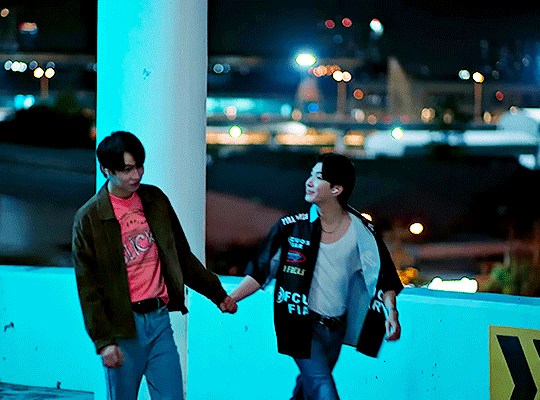
Personal Hygiene Lessons. In the last two episodes, we witness Ray’s community service teaching children about hygiene. “Once upon a time…” he begins, which immediately alerts me to television writers depicting the act of storytelling. It’s a story attempting to encourage daily toothbrushing to protect from plaque, but Sand steps in and scares them with the threat of a bug crawling into their body if they don’t brush their teeth—suspiciously more similar to issues of sexual health than teeth brushing. The next clinic presentation is about washing out your nose. Either Thailand’s got some hygiene practices I don’t know about, or Jojo’s writing team snuck in a sneaky reference to douching. Watching, I was reminded that Jojo and his good friend and fellow director Aof Noppharnach (Bad Buddy, ATOTS, so many other huge GMMTV series!) began their careers writing and directing a series directly about sexual health for GayOK Bangkok, produced by an HIV testing organization. After the first presentation, Sand explains, “I’m approachable to all ages and genders,” a prime marketing demographic if I’ve ever heard one! Just like Sand, Aof, who is now the senior director of content production at GMMTV, has made inroads for himself and others into a massive market by developing a writing, directing, and producing strategy for integrating queer content (here’s my post about his recurring motifs around HIV treatment) within family-friendly BL shows, often with a romantic fairytale-like quality hearkening back to Ray’s “Once upon a time…”
The Politician. The parents included in the series have distinguished economic and political circumstances they're associated with. Bear with me on the political-economy history lessons here. Boston, most prominently, has a father running for political office, and we meet him for the first time while Boston's wearing a 1998 t-shirt, the year the Thai Rak Thai (Thais Love Thais) party was founded by Thaksin Shinawatra, telecom billionaire and Thailand's first prime minister to lead a democratically elected government through a full-term in office beginning in 2001. He led key initiatives to promote tourism, make healthcare accessible, and, controversially, crackdown on drugs. Essentially, he provided the vision for the government that kick-started Thailand's move to its current project of soft-power. In fact, his youngest daughter, Paetongtarn Shinawatra, (who describes herself as a "socially liberal capitalist") is the current prime minister partly responsible for overseeing the equal marriage bill into law. Thaksin was ousted by a military coup in 2006 following his family's decision to sell its shares in major Thai telecom group to a Singaporean company and, faced with corruption charges in 2008, lived in exile (until September 2023, less than a month after Only Friends started airing). Ousted for not playing his part in supporting a Thai business? Boston, is that you? There is also a comment in the first episode about the massage parlor Boston's father built his financial success off of, and there's a conversation to be had there about Thailand's Thaksin-led shift away from and crackdown on its sex tourism industry. (The Department for Communicable Disease Control shirt on Style's shirt in episode 3 of The Heart Killers is a government organization in Thailand, not Alabama as the shirt says, which among other things monitors direct sex workers for STDs.) How might a focus on constant financial and moral improvement harm those who fail sanctions against promiscuity? What I find so artful about Boston's potential linkage to Thaksin is how he's constructed as Thaksin's parallel--in his journey toward exile and the over-consumption that led him there--and his antithesis. Boston's the victim, at least in his emotional well-being, of a neoliberal legacy. Thaksin's policies, similar to those of Rudy Giuliani and his predecessors in NYC, promoted family-friendly tourism and industry growth by supporting the corporate partnerships and broken window policing to price out and criminalize those unconventional populations who had taken refuge or even just found themselves in these locales after being marginalized elsewhere. In the same vein, the privileging of monogamous pairing in both BL narratives and BL fan-service expectations serve important goals encouraging breadths of people to accept and embrace gay love socially and politically—Thailand’s upcoming marriage rights bill, more expansive than most western countries, certainly has the BL industry’s influence to thank. Without further input, however, they neglect queer experiences beyond the realm of the first love or marriage plot. They neglect greater issues of equity, compassion, and freedom due to each individual human being (both actors and the general population), which the LGBT population, among others, has historically had an intimate experience with being denied or limited.
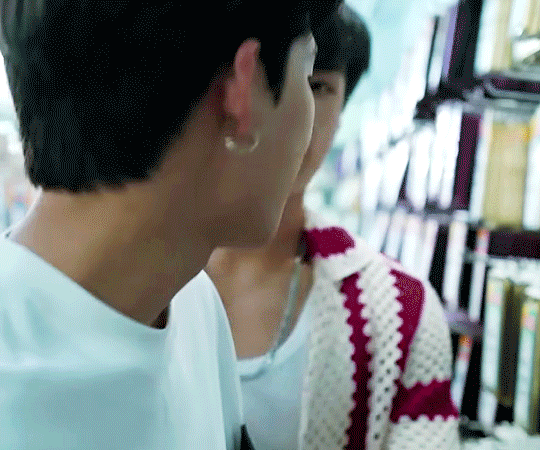
Nick’s Digital Underworld. Nick’s our little tech wunderkind in OnlyFriends. His character fixes phones, hooks up cameras and recording equipment, makes digital campaign posters, you name it! And I personally love that he’s both a skeevy pathetic tech wizard and radiantly beautiful. His cute-factor almost lets us forget about his voyeuristic tendencies. He’s just a content enjoyer, and Boston loves creating content—he just doesn’t want himself recorded…So why doesn’t Nick just get off to some porn instead? Only Friends didn’t name itself so closely to the amateur adult content website for no reason! In fact, we got an OnlyFans reference in The Heart Killers episode 4. Imma have to thank this post for noticing an OnlyFans sign in the background of Addicted Heroin Th and pointing out that it’s illegal in Thailand, cuz I had never considered anything about the country’s pornography laws or internet censorship. I’ll try to restrain myself from blabbering too much about the history I found here and here, but the important part: Thaksin’s once again our guy kicking it off. The Thaksin government censorship focused heavily on antipornography and the 2006 military coup brought in a more Orwellian political flavor to the proceedings, both of which have basically proliferated with continuing regime changes. In 2020, mainly because of increased censorship of adult websites (which is a current global conservative trend—I’m looking at you Project 2025—so don’t hate on Thailand too much), Thailand dropped to the third-lowest tier of internet freedom, according to the company Comparitech (which focuses on cybersecurity and online privacy), only above North Korea, China, and Iran. Both content creators and consumers can have some harsh punishments under the laws. With that in mind, it’s hard to imagine Jojo’s team giving us Boston’s pornographic art and Nick’s digital pornographic consumption as mere character dressing. The fact that they are the two excluded from the friend group at the end, excluded from the local business, from acceptance! Meanwhile, having censored the “deviant” contingent out of the equation, romance is alive and well at the OnlyFans—I mean, Only Friends hostel. As one kind of gay content is uplifted, another is suppressed and banished. No, Boston and the pornography industry he seems to signify are not perfect, but neither are his friends, nor the entertainments and political-economies with which they’re equated.
Without too much moralizing, these are the sorts of observations and hypocrisies Only Friends highlights. In my reading, at least, it depicts these media and economic trends through its characters, allowing them to play out and contend with one another as they have in reality. Sometimes the allegorical tensions or pairing of genres and capital occurs in the dynamics between characters. Other times, as I pointed out with Boston and his Thaskin connection, the tension exists within a single character. These strategies allow the show to engage with political issues while under the government’s censorship laws, but this is also just what great literary political writing looks like! It speaks to its time, but it will stand much longer as simply a character-driven story about the contentions that arise between money, sex, love, and friendship. I cannot wait for Girl Rules to give us Jojo’s GL perspective on related issues and for Only Friends Dream On to explore this territory in the context of an actual BL production! Let the chaotic theorizing ensue!
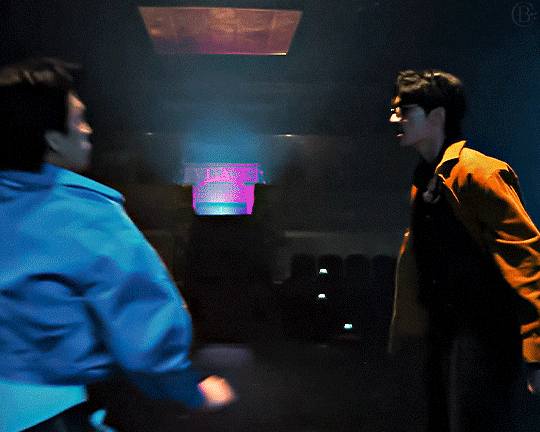
#only friends#only friends the series#only friends meta#only friends dream on#girl rules the series#jojo tichakorn#thai bl#bostonnick#sandray#topmew#the heart killers#bl discourse#ofts#bl drama
28 notes
·
View notes
Text
Even though we are most conscious of the big, widely spoken languages like English and Chinese, most languages are spoken by a much smaller number of people. Because of the sheer number of languages in the world, something like Estonian is much more typical. To a first approximation, nobody in the world ever learns Estonian. If an Estonian person wants to talk to someone who’s not Estonian, they speak English. In the past, they might have spoken Russian. But nobody is learning Estonian. And Estonian is very complicated, with 14 noun cases and all kinds of other trouble. But as Trudgill points out, even Estonian — with its ~1 million speakers and solid K-12 education system and some broadcast media — is much more widely spoken than most historical languages. The vast bulk of human history consists of language communities that had no television or radio or even writing, speaking face-to-face mostly to other people they actually know. Communities like that are Petri dishes of linguistic innovation. When I used to host “The Weeds,” Dara Lind liked to jokingly say things like “Teds Cruz” to mean “people like Ted Cruz” modeled on the pluralization of attorneys-general. That became an inside joke that Sarah Kliff and Jane Coaston and I picked up. And Trudgill says this is how language change works in small oral communities — someone makes something up because he or she thinks it’s clever, and if other people like it, they copy it. There aren’t a lot of entertainment options, language play is fun, and there’s no influx of foreigners learning your language and needing to simplify it. So you end up developing a kind of anti-creole, with lots of weird flourishes.
-Matthew Yglesias, Political lessons from Jamaican Patois
265 notes
·
View notes
Text
Can't get Murder Drones out of my head. Almost like some eldritch code has taken root inside my brain. It's probably fine.
Anyway, headcanons for what the murder trio were before Tessa got them:
J was almost certainly in some corporate position. I like to think she was involved in marketing, since she has all those buzzwords ingrained in her lexicon. Maybe they even had her working with graphic design with her art skills. I also imagine she kinda hates corporate structure. "Bootlicker J" jokes aside, I can't imagine even she would have fun as a (literal) corporate slave, and she definitely enjoys freely speaking her mind: not something that flies very well in corporate and marketing contexts. Maybe she got dumped during some convoluted office politics, maybe she was dumped due to random downsizing, who knows.
N's a bit trickier. We see a lot of dexterity and showmanship from him in the manor. He's quite flashy with the glassware at a few points. He also likes drawing, but is lacking in technical skill, especially compared to J. He's also quite personable and friendly, and also seems to truly admire J in some capacity. As a bonus, Cyn mimics a lot of N's mannerisms, and one of her defining traits is her acting, even specifically playing at "improv" while rebuilding J. Therefore, I think N was in theater/entertainment.
He wasn't necessarily an actor himself: still a robot slave after all. But he likely assisted with a lot of setup. Rehearsals, testing stunts, watching over pets/kids (whether those of actors or actors themselves), etc. He enjoys fancy costumes as well, and he's pretty genre aware. He's probably had his fair share of experience with horror movies/stories. Maybe he got dumped pissing off the wrong famous person, maybe some stunt went wrong and they didn't want to bother repairing him, maybe they just wanted the newest model.
V is tough to decide. She seems to enjoy fighting the most out of all of them, but none of them are really slouches in combat, so I don't think that says much about her past. We don't see much of her in the manor, but the impression she gives is a bit more shy and demure. We see her playing chess in the credits, but one hobby doesn't mean much on its own, especially since chess is a common game to put on computers: probably all of them have chess programs built-in.
With that little to go off of, and her tendency to both act out in outrageous ways and keep herself closed-off, I'm thinking she was probably a menial worker beforehand. Minimal freedom, in a position where she'd best keep her head down. Follow the rules closely in order to keep what little she has. "Do your job and I leave you and N alone" was probably a pretty good deal to V because it was as good or better than her previous work arrangements.
Could be a lot of jobs like that for a robo-slave. But let's have fun with it and extrapolate from her usage of "narc" and her apparent desensitization to violence: she was used by a criminal organization for clean-up duty, and got dumped after being confiscated by authorities.
41 notes
·
View notes
Note
I feel like when people ask famous personalities to participate in activism, they may be influenced by the parasocial relationships they have formed with these celebrities and not that they really care about what is going on. They expect famous individuals to act as role models or representatives of their beliefs. That's why I think, it is crucial to maintain a critical perspective and not depend solely on celebrities for activism. This can result in a passive approach to social change and disregard the significance of collaborative action and personal engagement. The majority of celebrities don't care lol even who speak up about it publicly. Their reality is different from ours, like Gigi Hadid also drank Starbucks the other day, Bella Hadid worked with a lot of Zionist brands and did a photo shoot with them recently, etc etc. And let me not start on stans culture... the worst thing ever
Okay this is fascinating because yes! I agree with you so much! But then I was completely floored by the choice of the HADIDS (literal Palestinians who never shut up about the cause) as examples- but actually I love it because I think it opens up two really really important points that maybe get to the heart of the whole issue. Gigi and Bella Hadid are, as I said, literally Palestinian, and have throughout their public lives (not just recently) never been silent or backed down in defense of Palestine even when it has very publicly lost them (Bella primarily) jobs and opportunities, and they both continue to be outspoken even while literally targeted and threatened by zionists. Pretty much everything anyone has wanted or asked for from any celebrity, right?! But here we have, first of all, Gigi having all of that discounted because she bought Starbucks, a brand that is not even an official boycott! I feel like this is a perfect example of prioritizing performative and symbolic activism over actions with material impact, if someone who has been so consistent and stalwart can see all that dismissed because they spent $5 on a coffee (that, again, has no material financial relationship to Israel). I personally think that on a scale of good done vs harm, Gigi can afford a lot of problematic coffees, and this is not even getting into the Hadid families finances which involve huge amounts of money being used and moved around in ways that do more to help the cause than any image choice can unbalance. And then you say that Bella has worked with zionist brands- I don't know anything about this so I can't speak to it. Given that we are also apparently considering starbucks a zionist brand despite the company not operating in or having any ties to Israel, I would question what this means. But it doesn't matter- I think the point is that consumer/ individual purity isn't possible! No one is making pure consumer choices, no matter how many brands they boycott, and certainly no celebrity can continue to be one without having unsavory connections. I think that BY DEFINITION no celebrity is politically pure because if they cut all those ties, THEY WOULD NO LONGER BE A CELEBRITY. Whether the pursuit of purity is realistic or desirable is a much bigger issue, but the point is that as you say, looking to celebrities to be activists will end only in disappointment. Their job is to entertain in specific ways and they do that; if that's not working for you, then consume some other celebrity's product (persona). As I have said from the start, if you want to stan Louis because he is talented and hot and kind and smart and fun then you are in luck! But if you are looking for an activist spokesperson, he is not going to be that, and yelling at him (or people who don't consider that a deal breaker) isn't going to change that.
#I'm aware that some people don't agree with me about what tactics are effective- welcome to activism! tactic squabbling is our signature!#but I do not appreciate having my opinions on tactics dismissed as defending a celebrities actions at any cost#which I don't think I have remotely done ever honestly I have repeatedly said that if you're looking for an activist#neither Louis nor any other celebrity is that or is going to be and I would recommend giving it up#I think dismissing my arguments as that is not only inaccurate but a bit of a bad faith topic change#but it is what it is🙃#blah blah blah#palestine#I have another ask that I will answer later and get more into the Louis part specifically#but first I'm gonna go do real life stuff! wild but true#starbucks discourse
36 notes
·
View notes
Text
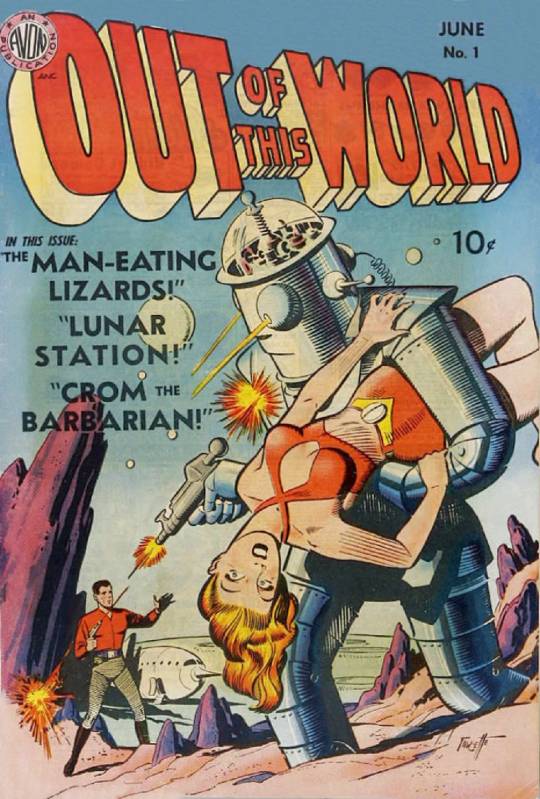
OUT OF THIS WORLD (vol. 1) #1 (June, 1950). Avon Publications. Cover by Gene Fawcette.
Ho hum. Just another science fiction comic, right?
Normally you'd be right. But this little gem contains the first appearance of the one-and-only Crom the Barbarian!
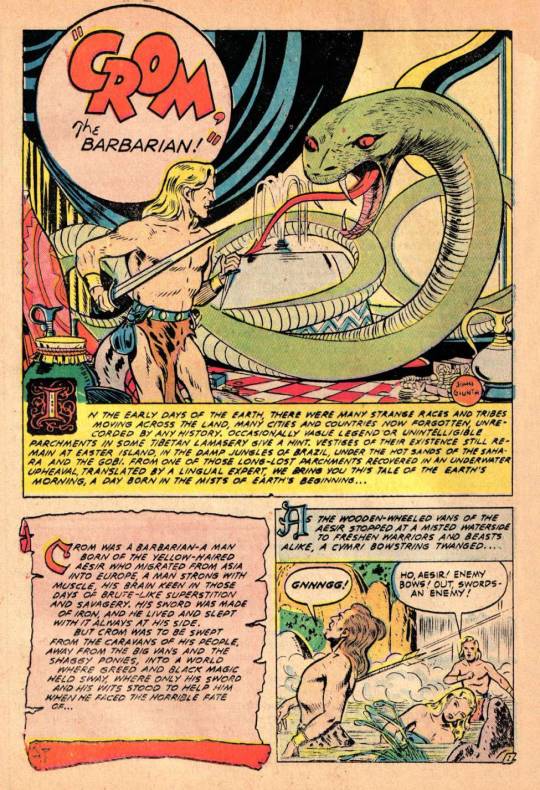
Yes, decades before a certain Cimmerian first appeared at Marvel Comics, writer Gardner Fox and artist John Giunta brought a very Conan-esque barbarian to the four-color pages.
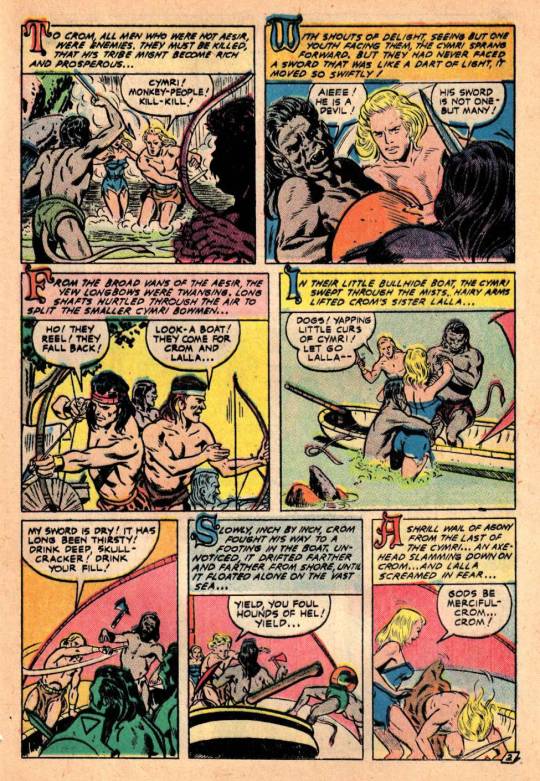
Curiously, Crom's tribe - emigrating from Northern Eurasia (perhaps Siberia, where blond hair is thought to have originated) - is called the Aesir. That's the collective name of the Norse gods of myth, not Asgardians, as Stan Lee and company would have you believe. Oddly enough, though, Crom makes reference to characters from Norse myth (Thor, Jormundgandir, Freya, Garm, Uller), as well as mythological characters from other countries (Set, Nessus). And another guy even invokes Zeus' name (here spelled "Zues").
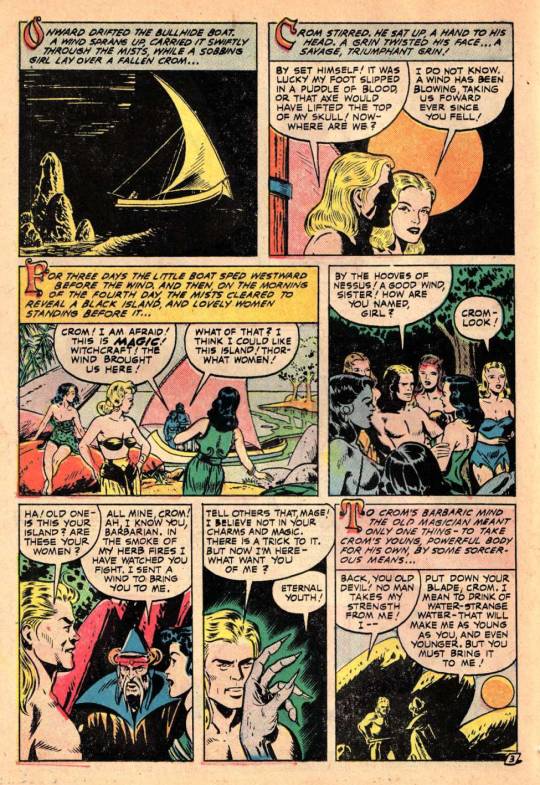
Crom was a very neighborly guy. According to the text, "To Crom, all men who were not Aesir were enemies. They must be killed, that his tribe might become rich and prosperous."
I could make a MAGA joke here, but that's too easy and obvious.
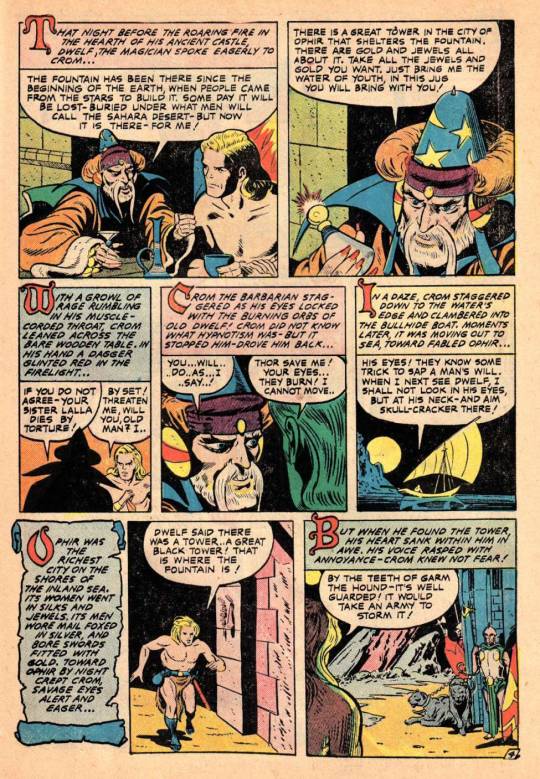
Crom also deftly wields a sword with the heartwarming moniker Skull-Cracker. He often talks to the sword, encouraging it to drink its fill of his enemies' blood. A real sweetheart, this Crom is.
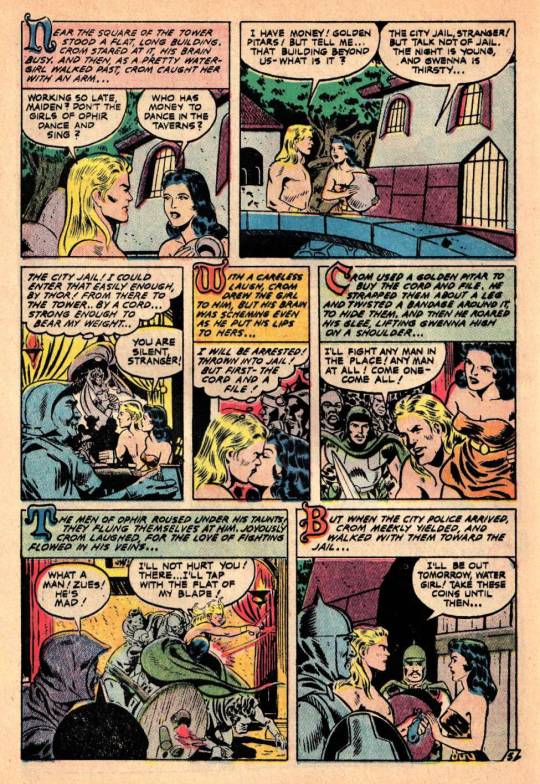
Crom is also quite the lusty fellow with an appreciative eye for the ladies. In just ten short pages he finds three different lasses that tickle his fancy.
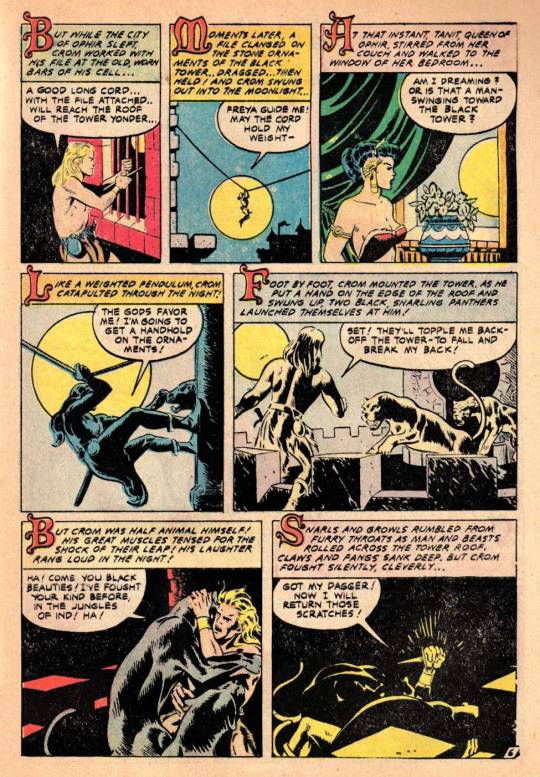
The last gal turned out to be a queen. Originally, she tried to knife Crom in the back because he was stealing a treasure from her vault.
Crom's response to that was "the barbarian way:" he grabbed her and kissed her until she fell limp in his arms.
Politically correct this ain't.
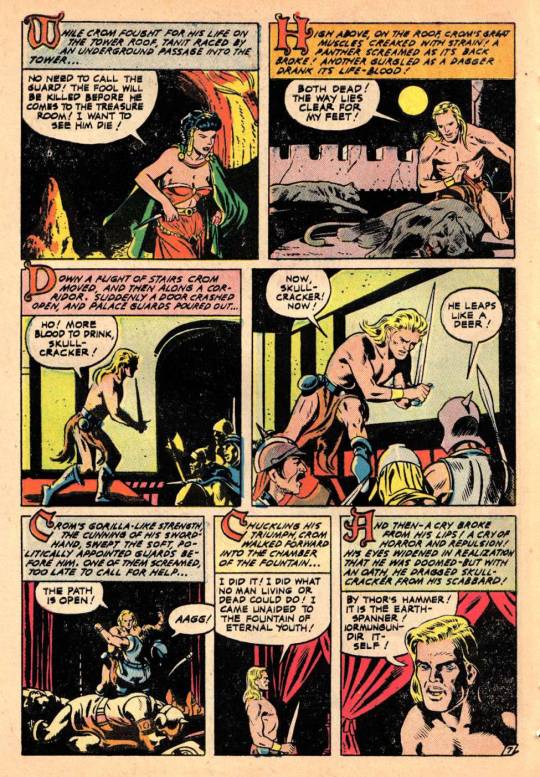
Speaking of political, it is said that "Crom's gorilla-like strength, the cunning of his sword-hand" (plus his ability to leap like a deer) "swept (away) the soft, politically appointed guards before him."

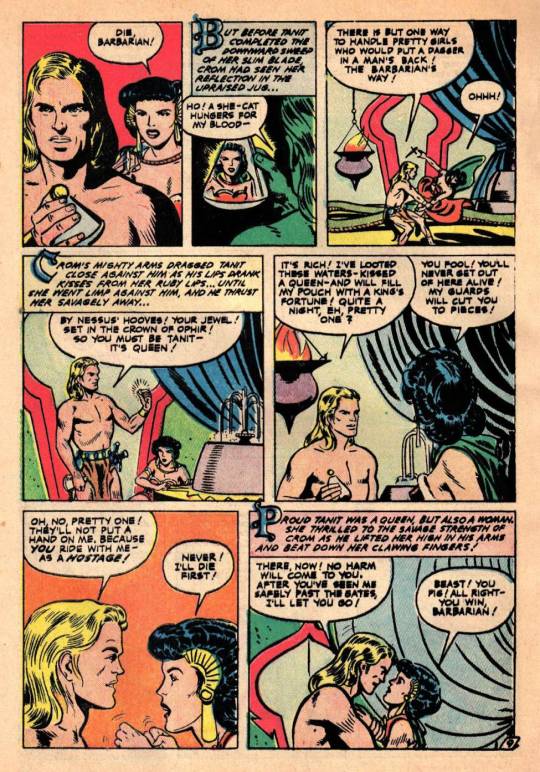
Back to the queen: despite Crom using her as a hostage to cover his escape, and threatening to kill her if she doesn't cooperate, two panels later she's in love with him and wants him to rule by her side as king.
That Crom, what a guy!
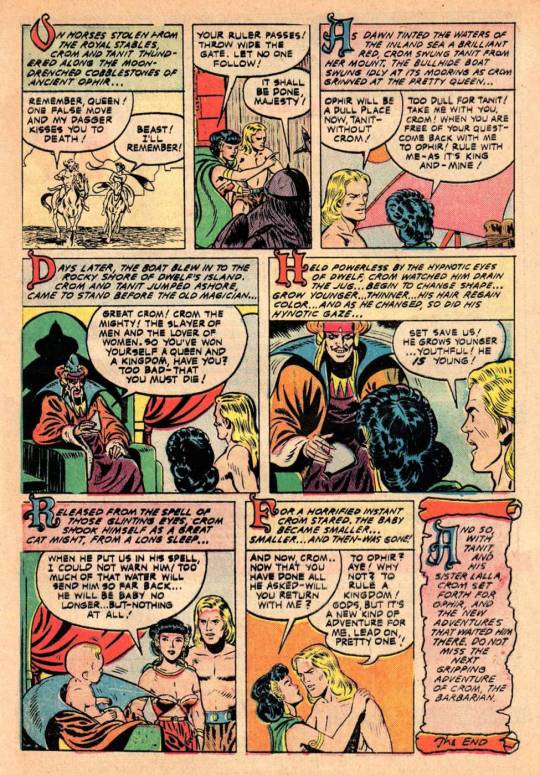
Like the Cimmerian he is likely based on, Crom is not role-model material. Mildly entertaining, yes, but I can see parents - especially mothers - back in the 1950s getting upset that little Johnny is reading this sort of stuff in a comic book.
Still, the story is relatively important because it is, arguably, the first Robert E. Howard-style sword and sorcery tale in comics. And as we all know by now, it would certainly not be the last.
#Out of This World#Crom the Barbarian#Gene Fawcette#Gardner Fox#John Giunta#Avon Publications#Golden Age comics#sword and sorcery
7 notes
·
View notes
Text
how to deal with door-to-door canvassers during political campaign season (and any other time of year)
hello, fellow USAmericans. as you may know (mild sarcasm), the presidential election is now slightly over one month away. political canvassers of all stripes began ramping up their campaigns last month, and this month things will get even more hectic.
I worked as a door-to-door canvasser for a political nonprofit for a few weeks last month! while that certainly doesn't make me an expert, I haven't seen anyone more knowledgeable about how canvassing works make a post like this, so...I'm here to do what I can.
bear in mind that this is mostly geared toward nonprofit and political door-to-door canvassing in the USA, but some of it applies to general canvassers and probably to some other countries too.
before we get into it: for those who just want to know the fastest way to get rid of a canvasser at your door without going into a readmore: it's either a) don't answer your door (even if we can see you through your window! you are under no obligation) or b) say "no thank you" and then close your door. we don't consider it rude and will in fact thank you for saving us both time and energy. that being said, please be polite!
and now, the full guide, beginning with:
the walkup.
first of all, be aware that canvassing can happen across a wide range of days and times. where I live, canvassing is allowed until 9pm if you can believe that. we only went til 8pm, but that's still very late in this part of the country. usually we were a M-F enterprise, but weekends are now on the table as the election nears, and of course religious canvassers and business canvassers will have their own models for when they come to your place.
canvassers will assess your house for loose dogs in the yard, "no trespassing" signs, "no soliciting" signs, locked gates, and the like.
generally canvassers will open simple latches. canvassers generally-to-always will NOT remove locks even if they are not fastened.
non-profit, political, and religious canvassers are allowed to ignore "no soliciting" signs because they are not asking for your money (assuming the political canvassers aren't fundraising, anyhow); people who want you to pay them to trim your trees or mow your lawn or whatever are not allowed to ignore these.
"no trespassing" signs are a little tougher. I made another post about it here.
that post also covers more ornate signs that say things like "no charities, no religion, no sales, no nothing. go away, my dog hates you and so do I", though those are a bit more of a grey area. suffice to say the more of them there are, the less likely we are to knock on your door.
however, the bottom line is that all of this varies slightly by jurisdiction so be sure to check your local bylaws. canvassers must go by the letter of the law so make sure that what you're putting on your front door will get you the intended effect. yes, this sometimes means ignoring your two dozen "no soliciting" signs.
the knock/the ring.
most canvassers only try a door twice. that can be one doorbell ring and one knock, two knocks, whatever. some try it three times. no one I worked with wanted to waste their time any more than that. we have quotas to hit and if you're not answering, you're not answering.
that being said, sometimes the same canvasser or a different canvasser from the same organization will come back around a few hours or even days later. if we come back on the same day, it's probably because our numbers are low or we finished early and we want to keep trying. if we come back on a different day, it might be a follow-up to the original visit or it might be a completely new topic they want to talk to you about. we always appreciate it a lot when people are willing to entertain repeat visits.
remember that you are under no obligation to answer the door. in fact, if you're just going to be nasty to us because we ignored your "no soliciting" sign, we prefer that you don't open the door. it saves all of us time and energy.
this includes if we made eye contact through the window, if you were actually in your garage or yard or car and you saw us as we walked up, anything like that. some canvassers are going to be more proactive than others in trying to engage with you in these cases. walk deeper into the house; close the garage door; pretend you don't see or hear us; whatever. canvassers don't care and won't hold it against you even if they are one of the more proactive types!
the contact: part 1 (intro).
often canvassers have a little mini speech they have to get through to introduce themselves and what they're doing on your doorstep before they'll actually get around to asking you their questions/offering to sell you whatever/handing you a pamphlet.
we try to keep this as short as possible because we know no one wants to be stuck on a doorstep forever, feel free to ask us to get to the chase if you're busy or what have you. we will usually oblige.
similarly, we try to keep it short because we know that other people from other organizations might have been here recently to ask you the exact same things and you're tired of it. if this is the case, we appreciate your patience and willingness to engage with us even if you've already done this rigmarole three times this week.
don't be surprised if people know your name and some of your information. for example, because they were a nonprofit, the canvassing company I worked for had access to the voter rolls. also don't be surprised if they have the information for the previous resident, especially if you live in an apartment. our information was often out of date by a couple of years.
the contact: part 2 (the sell).
if you don't want to answer the questionnaire, talk religion, or have your gutters cleaned, a polite "no thank you" and the immediate closing of your door will get rid of all but the sleaziest of canvassers.
you don't owe us anything more than that, and we will thank you for not wasting our time!
when I was canvassing, I was instructed to keep talking until I hear three hard "no"s or until I hear the click of a latch, so closing the door on us really is the fastest and easiest way to get rid of us. otherwise we will take your objections seriously (i.e. we will assume you are not lying to us to try and get away) and do our best to overcome them, thus wasting your time and ours.
whether or not you want to engage with the canvasser and whatever they're talking about, please bear in mind that a lot of us have quotas to hit if we want to keep our jobs. your taking two minutes out of your day to answer three questions or hear our our sales pitch or whatever will help us with that, and we appreciate it even if you're brusque or in a hurry or we don't personally agree with your opinions. we're really not there to judge you or throw your day out of whack. we're just there to do our jobs and get paid.
if you really want to go above and beyond for the canvasser and their job, we may have bonuses attached to optional-but-preferred things like signing up a newsletter or what have you. giving out your email address, even if it's a fake one or you unsubscribe immediately upon receiving your first letter, can be very helpful.
granted, there's less at stake for volunteer (some political and most religious) canvassers, but there's not always an easy way to tell those apart. do what you gotta do, really, but be aware that it may matter quite a bit to us.
and that's it! I understand that there can be a lot of distrust for door-to-door salespeople and canvassers, and I also definitely understand why, but it really doesn't have to be painful. again, even if you absolutely hate whatever it is they're trying to get you to do, a simple "no thank you" and closing your door will solve the problem 95% of the time. (2.5% of the rest of the time it may be a predatory canvasser who will continue to bother you, and 2.5% of the time it's a targeted campaign and the canvasser has to confirm your identity before they'll take no as an answer, so they'll be back to try again later.)
other do's and don't's:
do consider offering canvassers something to drink or a snack if you have any to spare, or the use of your bathroom if you really hit it off with someone. canvassing is often hot and sweaty/cold and damp work with unpleasant hours, and individual canvassers aren't always well looked-after (especially if they're volunteers)!
similarly, do consider offering to let a canvasser wait out a storm on your porch.
do remember that canvassers are people just like you, and that you live in a society that requires you to put up with behavior from other people that you don't like from time to time.
if you have a barking dog, do consider stepping outside of your house to speak with us. it'll be faster and easier.
don't ask us to touch or interact with your mailbox for any reason. it's a federal offense.
don't be an ass!
Thanks for reading. :)
#Jazz notes#current events#politics#half-relatedly and half to get this into the appropriate venues#USA#USAmerican politics#US politics#American politics#canvassing#get out the vote#election 2024#election2024
7 notes
·
View notes
Text
I guess the problem with The Boys is that it's trying to be a superhero story and a political satire (satire should probably be in scare quotes, but oh well) and those two things are diametrically opposed, resulting in both goals The Boys is trying ending up as total shit.
For instance, The Boys wants to make fun of conspiracy theorists. But in the world of The Boys, what conspiracy theory isn't true? Vought is an evil multinational corporations that conducts unethical experiments, has vast influence with the US government, owns the media and uses that power to cover up various crimes... the list goes on.
Now, obviously we can distinguish fiction from reality and say that The Boys isn't saying real-world conspiracy theories are true, just because they're depicting a world of huge conspiracies and lying governments. Now what they should do is just say "conspiracy theories are true in this fictional world" and leave it at that, the same way it's okay for James Bond to solve all his problems by shooting people and having promiscuous sex, because he's a made-up man in a pulp story meant for entertainment, not a role model to emulate.
But they just have to have their evil conspiracy theorists, complete with wrongheaded complaints about the mainstream media. Even though in this universe, they are completely right. The mainstream media is corrupt and covering up the facts.
If Seth Rogen wanted to tell a story about how bad conspiracy theorists are, he should've created a world where conspiracy theorists are wrong. That's Worldbuilding 101. But he wants to Brundlefly this evil superhero story together with whatever Trump owns send tweet he and Eric Kripke come up with, so we get a 'plot' that contradicts itself enough to be completely nonsensical.
15 notes
·
View notes
Text
today's disconnected but related Thoughts are about how stories should exist within "containers", and how problems in long-running TV series are typically introduced when the writers don't use those containers properly. I'm struggling to articulate it in a coherent order, but:
● an audience needs to be able to see some kind of boundary enclosing the story, otherwise it doesn't feel satisfying. This is why we have set plot structures like Freytag's Pyramid and Fichtean Curve which so many stories follow. Most storytelling formats lend themselves to this – novels, certain comic books and graphic novels, plays, and films all have a beginning and an end. You open the book or enter a theatre or switch on the telly, and you experience the story, and then it ends. The story might live with you afterwards, if it affected or resonated with you or made you want to analyse it, but if the creator did their job well you'll at least feel closure with it on a mechanical level (i.e., plot and character arcs have conclusions that you can see fit within the framework of the story, even if personally you didn't like or agree with something). The Good Place is an example of a TV series that did this very well, because the writers had a set vision for the series and they executed it.
● A lot of TV dramas and serials operate on the premise of being ongoing – a story that stretches on without any defined end in sight. This can be done well, but sometimes the story gets bloated and stale, or it ends up like separate swatches of cloth instead of an interwoven tapestry. I'm not saying this means every TV series automatically fails to tell a story in a satisfying way, or even that the series that don't are inherently bad. It works differently from books or films, and therein lie its strengths as a storytelling medium! For one thing, TV is excellent for character-focused stories, and these can go on and on for ages and still be enjoyable and entertaining (even if not "good" by critical artistic standards). There's also more flexibility in TV than in a film; the ongoing format lets writers string out rising and falling tension, and focus in and out on different plots/subplots across a far larger scope.
● The way these shows work is the overarching medium of the series contains smaller stories in the form of plots. The boundaries between one plot and the next usually need to be permeable, too – a plot arc should conclude satisfactorily, yes, but the things that happen in it ought to resonate with the larger narrative afterwards, otherwise it'll feel pointless to the audience. Ghost Whisperer is an example where the creators failed to do this, repeatedly: each of the five seasons introduces a new concept which seems to be building towards some kind of climax, and then... doesn't. Characters vanish from the story never to be mentioned again. Huge events that ought to have life-altering consequences for the characters only have consequences for a few episodes, and then it's swept under the rug. The series had its appeal in a fun concept and lovable characters, but was let down by the execution. By contrast, medical drama Grey's Anatomy has been going successfully since 2005. It has some continuity issues (like interns vanishing without explanation) and some plots are better than others, but on the whole it takes its status as a long-running story seriously and does it quite well.
● The streaming model and the way TV writers are treated is a factor, too. Even where the boundaries of a story have been pre-defined and could be executed well, the creators often don't have the chance. (and I'm sure the same is true of long-running manga/comic books/graphic novels, although I'm focusing mostly on TV here). Ratings, network politics and actors' personal lives/ambitions have a huge impact on what happens to a TV series, and the popularity or apparent success of a series doesn't always guarantee its continuation. Just look at Netflix's habit of axing series after 2 seasons! Or at Good Omens, which despite being written by Neil Gaiman, having a huge fanbase, and a pre-set story which would be concluded in three seasons, hasn't yet been officially greenlit for season 3 (afaik). The industry has created an environment where stories are commodified, and that's not an environment in which stories can flourish.
18 notes
·
View notes
Text
Do not misinterpret the Paradox of Intolerance to give yourself license to make trolling the sum total of your politics.
The Paradox of (In)Tolerance describes PHYSICAL safety. It is not a prescription to use the tools of the enemy to create change. That is foolish and its never been clearer to me than after this election why its a snake eating its own tail.
If you need more evidence than 2015 - 2024 why using the Paradox of Intolerance as an excuse to never educate, to never attempt persuasion, to ONLY meet ignorance with withering scorn, then let me ask you a hypothetical:
There is a Muslim with whom you have a close, personal relationship: a friend, a coworker, an in-law etc. They are very warm and courteous to you but sometimes they say things that hint at a worldview you don't quite grok or feels like they are a bit too credulous when it comes to rumors. At some point after election day they confess to you that they 1. didn't vote, 2. voted third party, or 3. voted for Trump: would you engage them in dialogue to try to understand why and try to persuade them why this was an error without intentionally insulting them? Or would you disavow them and never speak to them again to the fullest extent possible within the limits of your common ties? Would you encourage people you know in common to disavow them or would you engage these people in conversation about how best to reach your Muslim friend?
Now what I am getting at is not the same as asking you to do emotional and intellectual labor when you're burnt out and the other party is overtly abusive and clearly acting in bad faith or to show up, in person, in spaces where you feel like you may be physically in danger.
What I am saying is that the Paradox of Intolerance or self care should not become an excuse to abdicate any responsibility for doing any amount of outreach and education. To advocate for ourselves and for our values.
Kamala Harris going on Joe Rogan would not have changed the outcome of this election, but the growing tendency of people with liberal and leftist values to ignore these increasingly important venues in favor of only ever doing interviews inside the hug box is poison. We are losing the culture war and its not because we don't have the best, most witty entertainers to sell our ideas its because our avatars are not pitching their ideas to audiences they assume are unreachable or irrelevant.
Late Night monologues and leftist podcasts are an echo chamber. I love QAA, Behind the Bastards, and other "dirt bag left" forums but the model of deradicalization where you passively wait for the most open minded red pills and "enlightened centrists" to stumble upon something that might tilt their worldview ever so slightly has DEMONSTRABLY failed.
Those with silver tongues need to follow the example of Mayor Pete and Bernie Sanders and take the fight for real equality and humanism to the lion's den, or at least the boorish stoner gym bro's den. Rogan is a prime example of someone who has become stupider and meaner the more he is surrounded by people who nurture these instincts. He is a cautionary tale.
We should contemplate how this applies to our own lives and our own dealings.
No one should tolerate physical threats or emotional abuse.
But also we should not mislabel stupidity and ignorance as emotional abuse because our labor is not free.
And I've got news for people who themselves are marginalized: you're going to have to advocate for yourself.
We who are not marginalized can do our best to prepare the soil, to combat misinformation and prejudices, but if there is one thing to be learned from Trump's multiracial coalition its that experience reduces prejudice more than rhetoric. A few Latino and Asian men were Trump curious, tested the waters, and over time they've become more accepted. It ain't all sunshine and roses: Ramaswamy still has to deal with the likes of Anne Coulter, but he's benefited enormously from his willingness to tolerate a few bigoted morons in order to sell himself and his interests directly.
Coalition politics are messy, but you have to be seen in order to be seen as fully human. It just doesn't work any other way and I'm sorry for that. The rest of us can do our best to set an expectation that persons X,Y,&Z are chill and should be protected from morons but that will only achieve so much without some people willing to represent themselves: if they can without compromising safety. I'm under no illusions that for some populations, like trans people and undocumented immigrants, things might be headed to somewhere even bleaker and unsafe than it already is.
And again, louder for the people in the back, if you cannot be PHYSICALLY safe or you cannot be your best self at the moment, then you are not obligated to attempt outreach; but we are screwed if everyone abdicates all of the time forever.
#donald trump#election 2024#civil rights#joe biden#kamala harris#foucault's boomerang#human rights#resistance#paradox of tolerance#paradox of intolerance
3 notes
·
View notes
Text
What comes after neoliberalism?

In his American Prospect editorial, “What Comes After Neoliberalism?”, Robert Kuttner declares “we’ve just about won the battle of ideas. Reality has been a helpful ally…Neoliberalism has been a splendid success for the top 1 percent, and an abject failure for everyone else”:
https://prospect.org/economy/2023-03-28-what-comes-after-neoliberalism/
If you’d like an essay-formatted version of this post to read or share, here’s a link to it on pluralistic.net, my surveillance-free, ad-free, tracker-free blog:
https://pluralistic.net/2023/03/28/imagine-a-horse/#perfectly-spherical-cows-of-uniform-density-on-a-frictionless-plane
Kuttner’s op-ed is a report on the Hewlett Foundation’s recent “New Common Sense” event, where Kuttner was relieved to learn that the idea that “the economy would thrive if government just got out of the way has been demolished by the events of the past three decades.”
We can call this neoliberalism, but another word for it is economism: the belief that politics are a messy, irrational business that should be sidelined in favor of a technocratic management by a certain kind of economist — the kind of economist who uses mathematical models to demonstrate the best way to do anything:
https://pluralistic.net/2022/10/27/economism/#what-would-i-do-if-i-were-a-horse
These are the economists whose process Ely Devons famously described thus: “If economists wished to study the horse, they wouldn’t go and look at horses. They’d sit in their studies and say to themselves, ‘What would I do if I were a horse?’”
Those economists — or, if you prefer, economismists — are still around, of course, pronouncing that the “new common sense” is nonsense, and they have the models to prove it. For example, if you’re cheering on the idea of “reshoring” key industries like semiconductors and solar panels, these economismists want you to know that you’ve been sadly misled:
https://foreignpolicy.com/2023/03/24/economy-trade-united-states-china-industry-manufacturing-supply-chains-biden/
Indeed, you’re “doomed to fail”:
https://www.piie.com/blogs/trade-and-investment-policy-watch/high-taxpayer-cost-saving-us-jobs-through-made-america
Why? Because onshoring is “inefficient.” Other countries, you see, have cheaper labor, weaker environmental controls, lower taxes, and the other necessities of “innovation,” and so onshored goods will be more expensive and thus worse.
Parts of this position are indeed inarguable. If you define “efficiency” as “lower prices,” then it doesn’t make sense to produce anything in America, or, indeed, any country where there are taxes, environmental regulations or labor protections. Greater efficiencies are to be had in places where children can be maimed in heavy machinery and the water and land poisoned for a millions years.
In economism, this line of reasoning is a cardinal sin — the sin of caring about distributional outcomes. According to economism, the most important factor isn’t how much of the pie you’re getting, but how big the pie is.
That’s the kind of reasoning that allows economismists to declare the entertainment industry of the past 40 years to be a success. We increased the individual property rights of creators by expanding copyright law so it lasts longer, covers more works, has higher statutory damages and requires less evidence to get a payout:
https://chokepointcapitalism.com/
At the same time, we weakened antitrust law and stripped away limits on abusive contractual clauses, which let (for example) three companies acquire 70% of all the sound recording copyrights in existence, whose duration is effectively infinite (the market for sound recordings older than 90 is immeasurably small).
This allowed the Big Three labels to force Spotify to take them on as co-owners, whereupon they demanded lower royalties for the artists in their catalog, to reduce Spotify’s costs and make it more valuable, which meant more billions when it IPOed:
https://pluralistic.net/2022/09/12/streaming-doesnt-pay/#stunt-publishing
Monopoly also means that all those expanded copyrights we gave to creators are immediately bargained away as a condition of passing through Big Content’s chokepoints — giving artists the right to control sampling is just a slightly delayed way of giving labels the right to control sampling, and charge artists for the samples they use:
https://doctorow.medium.com/united-we-stand-61e16ec707e2
(In the same way that giving creators the right to decide who can train a “Generative AI” with their work will simply transfer that right to the oligopolists who have the means, motive and opportunity to stop paying artists by training models on their output:)
https://pluralistic.net/2023/02/09/ai-monkeys-paw/#bullied-schoolkids
After 40 years of deregulation, union busting, and consolidation, the entertainment industry as a whole is larger and more profitable than ever — and the share of those profits accruing to creative workers is smaller, both in real terms and proportionally, and it’s continuing to fall.
Economismists think that you’re stupid if you care about this, though. If you’re keeping score on “free markets” based on who gets how much money, or how much inequality they produce, you’re committing the sin of caring about “distributional effects.”
Smart economismists care about the size of the pie, not who gets which slice. Unsurprisingly, the greatest advocates for economism are the people to whom this philosophy allocates the biggest slices. It’s easy not to care about distributional effects when your slice of the pie is growing.
Economism is a philosophy grounded in “efficiency” — and in the philosophical sleight-of-hand that pretends that there is an objective metric called “efficiency” that everyone can agree with. If you disagree with economismists about their definition of “efficiency” then you’re doing “politics” and can be safely ignored.
The “efficiency” of economism is defined by very simple metrics, like whether prices are going down. If Walmart can force wage-cuts on its suppliers to bring you cheaper food, that’s “efficient.” It works well.
But it fails very, very badly. The high cost of low prices includes the political dislocation of downwardly mobile farmers and ag workers, which is a classic precursor to fascist uprisings. More prosaically, if your wages fall faster than prices, then you are experiencing a net price increase.
The failure modes of this efficiency are endless, and we keep smashing into them in ghastly and brutal ways, which goes a long way to explaining the “new commons sense” Kuttner mentions (“Reality has been a helpful ally.”) For example, offshoring high-tech manufacturing to distant lands works well, but fails in the face of covid lockdowns:
https://locusmag.com/2020/07/cory-doctorow-full-employment/
Allowing all the world’s shipping to be gathered into the hands of three cartels is “efficient” right up to the point where they self-regulate their way into “efficient” ships that get stuck in the Suez canal:
https://pluralistic.net/2021/03/29/efficient-markets-hypothesis/#too-big-to-sail
It’s easy to improve efficiency if you don’t care about how a system fails. I can improve the fuel-efficiency of every airplane in the sky right now: just have them drop their landing gear. It’ll work brilliantly, but you don’t want to be around when it starts to fail, brother.
The most glaring failure of “efficiency” is the climate emergency, where the relative ease of extracting and burning hydrocarbons was pursued irrespective of the incredible costs this imposes on the world and our species. For years, economism’s position was that we shouldn’t worry about the fact that we were all trapped in a bus barreling full speed for a cliff, because technology would inevitably figure out how to build wings for the bus before we reached the cliff’s edge:
https://locusmag.com/2022/07/cory-doctorow-the-swerve/
Today, many economismists will grudgingly admit that putting wings on the bus isn’t quite a solved problem, but they still firmly reject the idea of directly regulating the bus, because a swerve might cause it to roll and someone (in the first class seats) might break a leg.
Instead, they insist that the problem is that markets “mispriced” carbon. But as Kuttner points out: “It wasn’t just impersonal markets that priced carbon wrong. It was politically powerful executives who further enriched themselves by blocking a green transition decades ago when climate risks and self-reinforcing negative externalities were already well known.”
If you do economics without doing politics, you’re just imagining a perfectly spherical cow on a frictionless plane — it’s a cute way to model things, but it’s got limited real-world applicability. Yes, politics are squishy and hard to model, but that doesn’t mean you can just incinerate them and do math on the dubious quantitative residue:
https://locusmag.com/2021/05/cory-doctorow-qualia/
As Kuttner writes, the problem of ignoring “distributional” questions in the fossil fuel market is how “financial executives who further enriched themselves by creating toxic securities [used] political allies in both parties to block salutary regulation.”
Deep down, economismists know that “neoliberalism is not about impersonal market forces. It’s about power.” That’s why they’re so invested in the idea that — as Margaret Thatcher endlessly repeated — “there is no alternative”:
https://pluralistic.net/2021/11/08/tina-v-tapas/#its-pronounced-tape-ass
Inevitabilism is a cheap rhetorical trick. “There is no alternative” is a demand disguised as a truth. It really means “Stop trying to think of an alternative.”
But the human race is blessed with a boundless imagination, one that can escape the prison of economism and its insistence that we only care about how things work and ignore how they fail. Today, the world is turning towards electrification, a project of unimaginable ambition and scale that, nevertheless, we are actively imagining.
As Robin Sloan put it, “Skeptics of solar feasibility pantomime a kind of technical realism, but I think the really technical people are like, oh, we’re going to rip out and replace the plumbing of human life on this planet? Right, I remember that from last time. Let’s gooo!”
https://www.robinsloan.com/newsletters/room-for-everybody/
Sloan is citing Deb Chachra, “Every place in the world has sun, wind, waves, flowing water, and warmth or coolness below ground, in some combination. Renewable energy sources are a step up, not a step down; instead of scarce, expensive, and polluting, they have the potential to be abundant, cheap, and globally distributed”:
https://tinyletter.com/metafoundry/letters/metafoundry-75-resilience-abundance-decentralization
The new common sense is, at core, a profound liberation of the imagination. It rejects the dogma that says that building public goods is a mystic art lost along with the secrets of the pyramids. We built national parks, Medicare, Medicaid, the public education system, public libraries — bold and ambitious national infrastructure programs.
We did that through democratically accountable, muscular states that weren’t afraid to act. These states understood that the more national capacity the state produced, the more things it could do, by directing that national capacity in times of great urgency. Self-sufficiency isn’t a mere fearful retreat from the world stage — it’s an insurance policy for an uncertain future.
Kuttner closes his editorial by asking what we call whatever we do next. “Post-neoliberalism” is pretty thin gruel. Personally, I like “pluralism” (but I’m biased).
Have you ever wanted to say thank you for these posts? Here's how you can do that: I'm kickstarting the audiobook for my next novel, a post-cyberpunk anti-finance finance thriller about Silicon Valley scams called Red Team Blues. Amazon's Audible refuses to carry my audiobooks because they're DRM free, but crowdfunding makes them possible.
http://redteamblues.com
[Image ID: Air Force One in flight; dropping away from it are a parachute and its landing gear.]
#pluralistic#crypto forks#economism#imagine a horse#perfectly spherical cows of uniform density on a frictionless plane#neoliberialism#inevitabilism#tina#free markets#distributional outcomes#there is no alternative#supply chains#graceful failure modes#law and political economy#apologetics#robert kuttner#the american prospect
69 notes
·
View notes
Text
The Fatphobia Central to Colbert's "The Indict-Mare Before Christmas"
How is no one talking about this? I'm not being hyperbolic - I can't find anything. I don't know if it's because online leftists are no longer in Colbert's audience or if fat activists don't find this media to be important, but I have to talk about it. If you want to catch up with the state of moderate liberal politics, watch this special. And read the glowing comments. It's a mildly entertaining animation that crams in as many political references from the year as possible, but the action hinges on Trump becoming a fat monster.
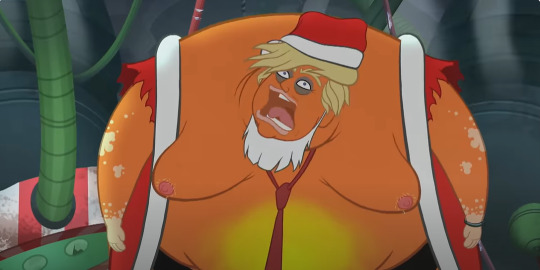
With so many peppered in references to conservatives set up for ridicule like bowling pins, I feel like I'm watching FreedomToons or the Babylon Bee. The comments feel similar. "Brilliant." "Genius." "Hilarious." "A Masterpiece." Oh my goddddd. This cartoon would hardly be the first time a "children's" parable depicted greedy villains as physically grotesque -corpulent or otherwise. But like... we shouldn't do it anymore? And it's real rich seeing a fat villain opposite SANTA CLAUS. Santa is a famous example of the jolly fat man archetype. A kind of "good fatty" - what TV Tropes calls "Big Fun" - an exception to the rule that all fat people are to be maligned. Such a person is joyful or comical and exists to serve thin people. But it's a mindfuck to see Santa make a fat joke at someone else! I suppose the writers were trying to get around this by identifying the source of Santa's powers as his "belly jelly," which Elon Musk sucks out of him and transfers to Donald Trump.
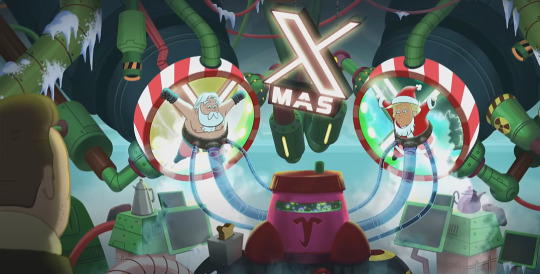
But Trump doesn't just get the jelly (visibly glowing) - he becomes way fatter. And the animators did not skimp on the details!
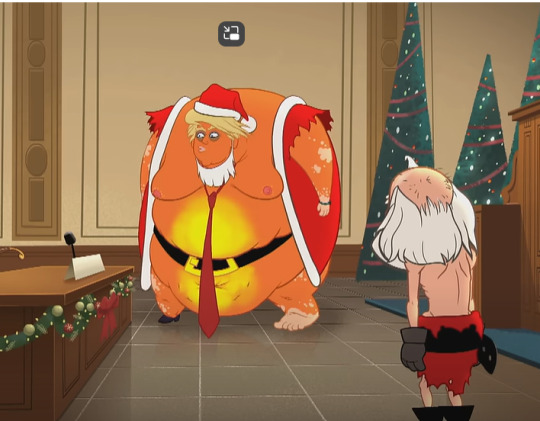
I've complained about the overly simple "egg on two sticks" model used for fat people in cartoons, but this Trump monster comes complete with a hanging belly pouch and thighs with folds and cellulite throughout! And his breasts... ...which Santa slaps around as they're fighting. Here's some of that:
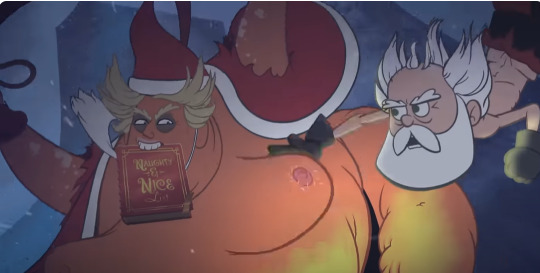
Trump belches after he absorbs Santa's jelly and in the end, eating a present meant for someone he cares about is his undoing. In this special, greed and gluttony are one, and are shown as clear vices that embody Trump's wickedness.
#fatphobia#animation#stephen colbert#cartoon#trump#media analysis#media criticism#christmas#tv#tv shows#political cartoon#liberals#fat representation
7 notes
·
View notes
Text
Yanks! How to kill Donald Trump!
It is evident that the piece is satirical in nature; it is implausible that any reasonable person would desire the demise of an orange, hairy, elderly individual who exhibits no signs of empathy. mod
The Mexico method
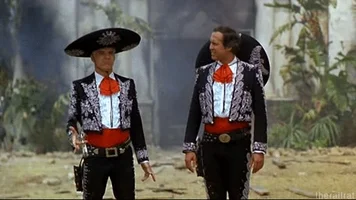
Trump has recognized it! Mexico doesn't necessarily send its elite to the USA: "They're bringing drugs. They're bringing crime. They're rapists." Use these resourceful human resources from the south and hire one or two pistoleros to put an end to "El Trumpo", as they call him down there. Somehow his death can be chalked up as collateral damage in the "war on drugs". But hurry, before the wall is finished! Big plus: Mexican hitmen rarely charge more than
more than 1000 pesos per head.
The world war method
Perhaps a little time-consuming, but tried and tested: Simply goad your new leader into a world war, give him hope of global domination with early victories, and then fail so mercilessly until he poisons and shoots himself in his Trump bunker with Melania. Disadvantage: A few hundred million other people die too. Advantage: You can feel like a morally superior people afterwards after a proper reappraisal.
The Kennedy method
A president who is not part of the political elite and indulges in liberties with the ladies? Something goes through the back of your mind, doesn't it? Exactly: it's time for a reboot of another American entertainment classic! It doesn't have to be Dallas and a Lincoln convertible again, and it can be a bit more violent - technology has made some progress in this area. But beware: you have to be prepared for Oliver Stone to take on the material.
The Indian blanket method
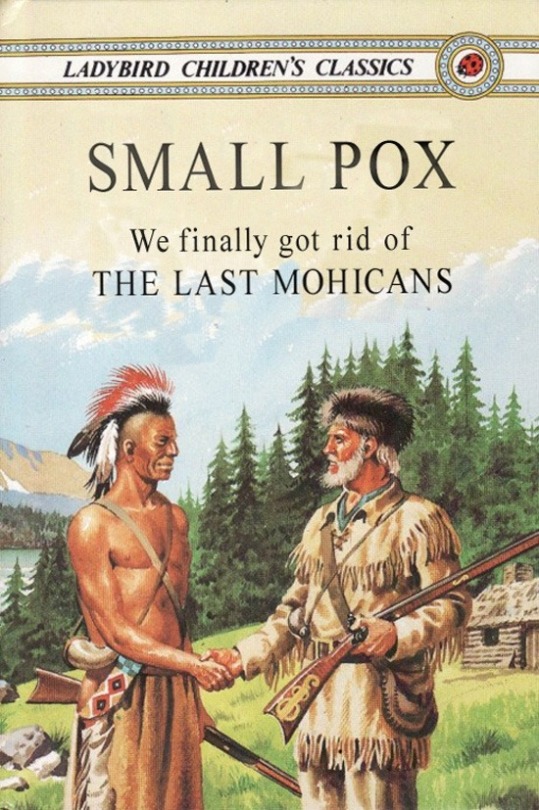
You should know how to get rid of unpleasant redskins, dear Americans. Problem: Trump certainly won't accept simple blankets as gifts, they would have to contain his gold-embroidered face as well as smallpox. Advantage: It's inconspicuous - you won't notice any major external changes in him.
The Beau Rivage method
A little elaborate, but the result is genuine German workmanship. Arrange a meeting with Donald Trump in one of his hotels under a pretext ("We need to talk about your back taxes ..."), mix a colorful drug cocktail into his alcohol cocktail and wait until the belligerent president falls to the floor with a resounding *trump*. Put the corpse in a full bathtub, inform the press and sneak away. Forge a farewell letter to boost credibility: "This was suicide. The best suicide ever. It was definitely me. Trump out!"
The Booth method
The shooting of Abraham Lincoln in Washington's Ford's Theater went off without a hitch and is crying out to be repeated. Problem: Donald Trump would never voluntarily enter a theater in his life. However, we have it on good authority that the carnivorous head of state does the honors every Tuesday night at the U-20-only strip club "Nasty's". One of the exotic dancers could distract Trump with a particularly patriotic lap dance, while another uncorks a well-shaken bottle of champagne from behind ...
The Goldfinger method
You know the quality of German murder not only from the History Channel. Because we have, of course, also provided the best Bond killers. Role models all of them! And the Manhattan Midas, who never runs out of gold, no matter what he paws at, using the old Goldfinger method - could it be more fitting? No!
The total crash method
Psycho against psycho! Let Air Force One poach a young pilot from Germanwings, and soon the only impact still coming from President Trump will be in the Rocky Mountains ... Possible downside: stricter air safety laws, increasing restrictions on civil air traffic, uncertainty among travelers, anger among the people, protest vote, fascism, shit!
The pussy method
A plan that will only work if all American women, who D. Trump considers "at least a 6", go along with it: Attach dirty miniature bombs (ACME Anti Grabbing Device™) to your primary and secondary sexual characteristics and wait for the pre-feminist leader of the free world to come near you. One tender assault and a discharge later, you should be rid of your greatest adversary.
The point-and-feather method
500 million jokes, taunts and excessive exaggerations could not prevent Donald Trump's election victory. But there is one hairdo-Hitler-small-hands-pussy-grab joke from which Trump will not recover. He will laugh and be ashamed at the same time. Problem: Only TITANIC is in possession of this nuclear Ulk - and will only hand him over for a high transfer fee. So: Better scrape your dollars together, Yanks!
Gaitzsch / Riegel / Wolff
#Titanic Magazin#satire#Gaitzsch / Riegel / Wolff#germany#freedom of expression#classic#16/12#donald trump#trump shooting
4 notes
·
View notes
Text
I like the unique thrill and experience of someone writing a fic about an industry or topic they clearly know nothing about and pretending they understand how it works because it's both wish fulfillment and also absurd as fuck in the funnest way.
Coffee/flower shop aus written by people who have clearly never once worked service industry.
Idol/actor/pop star AUs written by someone who clearly knows nothing about the entertainment industry or how contracts work. Bonus points for not understanding how music works at all. Like doesn't understand how a flute, guitar, piano, etc at all works. It's beautiful.
Fashion model/designer where clearly the writer has never seen or used an actual sewing machine and has no idea what a top stich actually means or even what chiffon is. And also understands modeling as only as far as America's next top model
Tattoo AUs where clearly you've never sat in a chair for hours getting stung by a needle over and over after going through a whole consultation and design process for the tattoo you want and the artist has spent time making sure the design is to your specifications and is within their skillset. The amount of times I've read a tattoo taking minutes when it's a multi session hours long tattoo is so great.
AUs where a love interest gets turned into an animal and then everyone acts like they have never seen a cat in their life and dismiss any human behavior. The amount of fics where people are just 'oh no what do I feed a cat????' While holding a smart phone baffle me. I love it
Geishas AUs where clearly you haven't done your research and are conflating them with sketchy brothels and order specifically inaccurate concepts that you've absorbed through anime.
Royalty AUs where the understanding of politics is not just whatever but clearly the writer doesn't know the difference between a Duke and Lord going around throwing random terms and whatever. Always a fun time.
And just a special shout out to this one Maximim Ride DN Angel crossover fic I read in middle school that was inexplicably set in Venice but also all the DN Angel Characters where explicitly speaking English and Japanese and within fic cannon there was just a large portion of Japanese people in this one subsect of Venice and nobody understood why. I love you so much. I think so often about this.
There's something so magical about people writing about something they don't understand because it's so idealic and dreamy in a way we wish was real but never is. And one day I hope for a world where getting hit on by a job as I serve coffee at a middling indie coffee store is endearing and not a reason to tell my manager to change my shift and position
3 notes
·
View notes